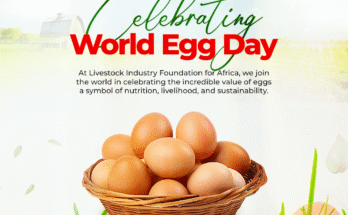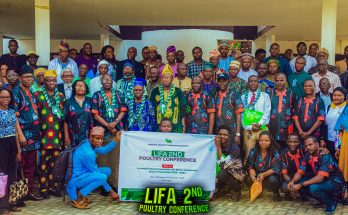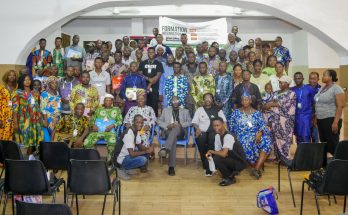Noble FM (107.1) an indigenous radio station on 8th December 2020 invited the president of Livestock Industry Foundation for Africa (LIFA) in person of Dr. Stephen Adejoro for a discuss; LIVESTOCK AND ALTERNATIVE TO ECONOMIC DIVERSIFICATION in a radio section called BENBE ORO anchored by: Mr. Saheed Alatise and Mrs. Olajumoke Bello.
The program which commenced at exactly 8:00am focused on the current crisis facing the livestock industry of Nigeria. The presenter started by asking Dr. Adejoro the following questions:
Presenter: Why is poultry product high in price?
Dr. Stephen Adejoro: In setting up a business especially in poultry business, two things are important; cost and sales. For a business to flourish, cost subtracted from sales must be equal to profit, so therefore in a business what we buy is what we sell. In poultry feed production two things are crucial; maize and soybean. Early this year the price of maize was at ₦85,000 per ton, but now the cost has increased to ₦160,000 – ₦170,000. Soybean was sold before at around ₦100,000 per ton but currently sold at about ₦250,000 per ton. In view of the cost analysis, how much do you want the poultry farmers to sell their produce? Even with the situation of high cost of feed, yet farmers still have to sell without looking at the profit margin just to keep their business sustainable.
One thing every individual needs to know is that eggs are so beneficial to the health of human beings due to its loaded nutrient functionality. At the onset of the global pandemic crises (COVID-19), researchers reported that to mitigate the spread of COVID-19, every individual must be encouraged to eat an egg a day in order to boost the immunity system of their body. Governments were persuaded to include eggs as palliatives to be shared among every member of the communities. But to our greatest surprise, only a few states were able to include eggs as palliatives shared among members of their communities.
If the government could buy eggs from the farmers as palliatives to be shared not minding the cost placed on the product, then we can attribute it to what we called social responsibility. No amount of money spent by the government can level or measure the life risk of a teenager to the threat of COVID-19. Once this is done, then it will ease the burden facing the poultry industry of Nigeria.
Another beauty of eggs is that most vaccines produced by health organizations used eggs as one of the constituents for the production of vaccines. So if we don’t have the technology to produce vaccines for prevention of infectious diseases in Nigeria, then we should encourage individuals to consume eggs.
Presenter: Apart from frying and boiling, what other method do we have for the consumption of eggs?
Dr Stephen Adejoro: In LIFA, an NGO that work for the good of the industry advocates an initiative on different ways eggs can be consumed neither by frying nor boiling. LIFA believes eggs can be incorporated in all Nigeria recipes; Moimoi, vegetable soup, Amala, Tuwo, Akara, etc. Egg consumption is not limited to any age range. We often say egg consumption is not good for old aged people, but with authentic affirmation, eggs possess good cholesterol which is good for everybody including the old people.
Presenter: What is the problem facing Nigeria economy?
Dr. Stephen Adejoro: Every country that rely on oil natural resources will end up in poverty. Majority of the countries blessed with oil as natural resources re-invest income generated from oil to develop other sectors of the country that will massively generate income to their country’s economy. But the question we should ask ourselves is; what did Nigeria government use income generated from oil for?
Presenter: Maize and Soybean are planted in Nigeria, why is it that poultry farmers are not using it for their poultry feeds production?
Dr. Stephen Adejoro: Nigeria maize is the best compared to imported maize. The consumption rate of maize is very high based on its demand by different manufacturer companies. Even with a high rate in demand of maize, yet it’s still exported to other neighboring countries in Africa. The poultry industry of Nigeria only needs 30% of maize production in Nigeria but still not abundantly available for poultry feeds production.
Presenter: What are the steps taken by the poultry association of Nigeria to solve the problems facing the industry?
Dr. Stephen Adejoro: Poultry association of Nigeria are trying their best to inform the government on the current challenges the industry is passing through. More so, LIFA being a livestock NGO advocate to improve the wellbeing of the industry.
Presenter: What do you expect from the government?
Dr. Stephen Adejoro: The government should;
- Restrict the exportation of raw materials like maize to other West Africa parts of the country. This will reduce the scarcity level of maize in Nigeria.
- Provide the shortage level of raw material (maize) by importation to assist the industry.
- Provide a conducive environment for the farmer.
- Make grants available for the farmers.
In conclusion, if you kill feed, then you have killed the poultry industry of Nigeria.




